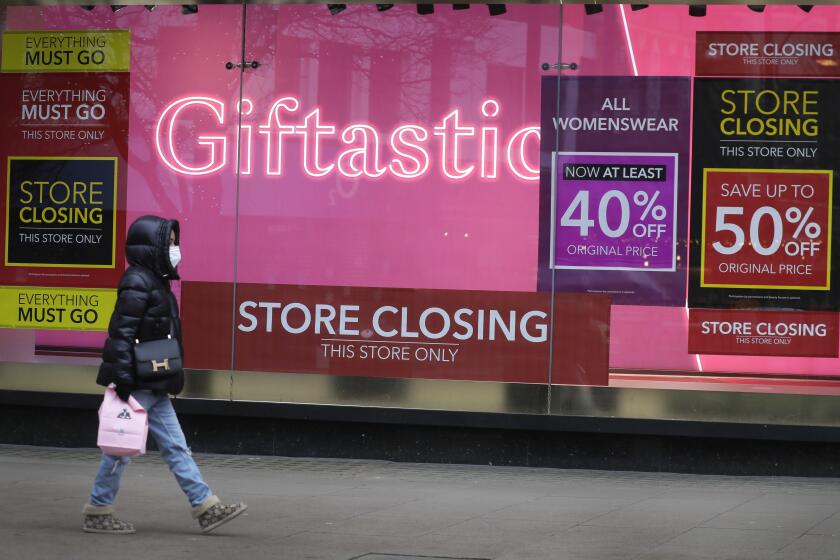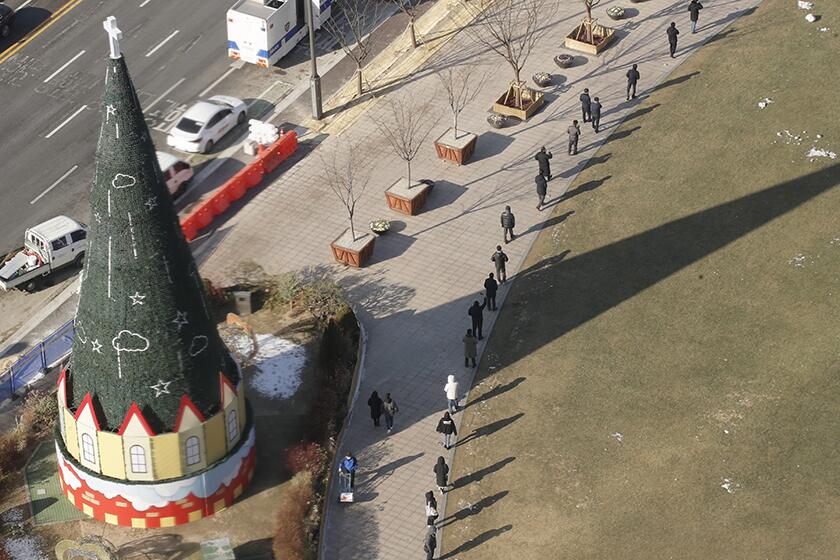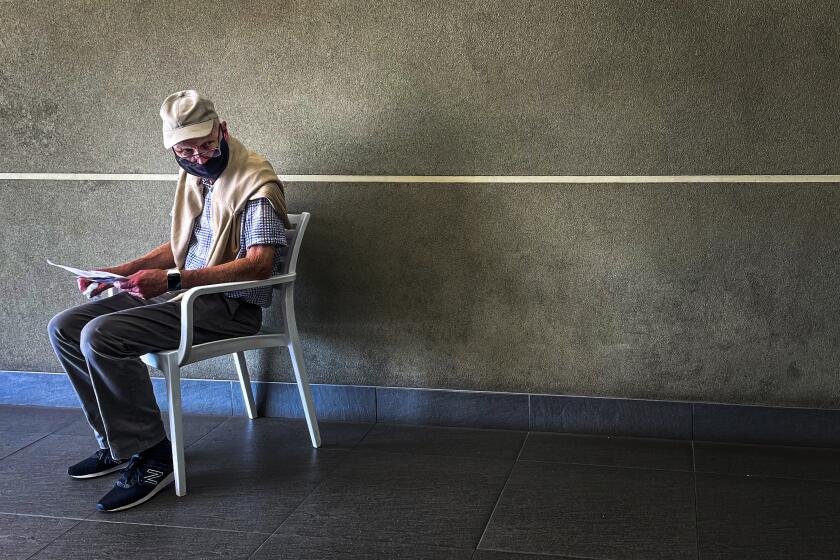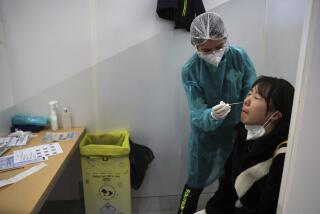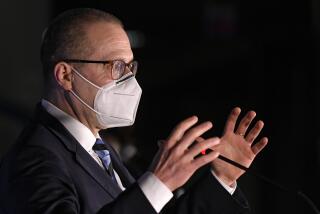European Union nations kick off mass COVID-19 vaccinations
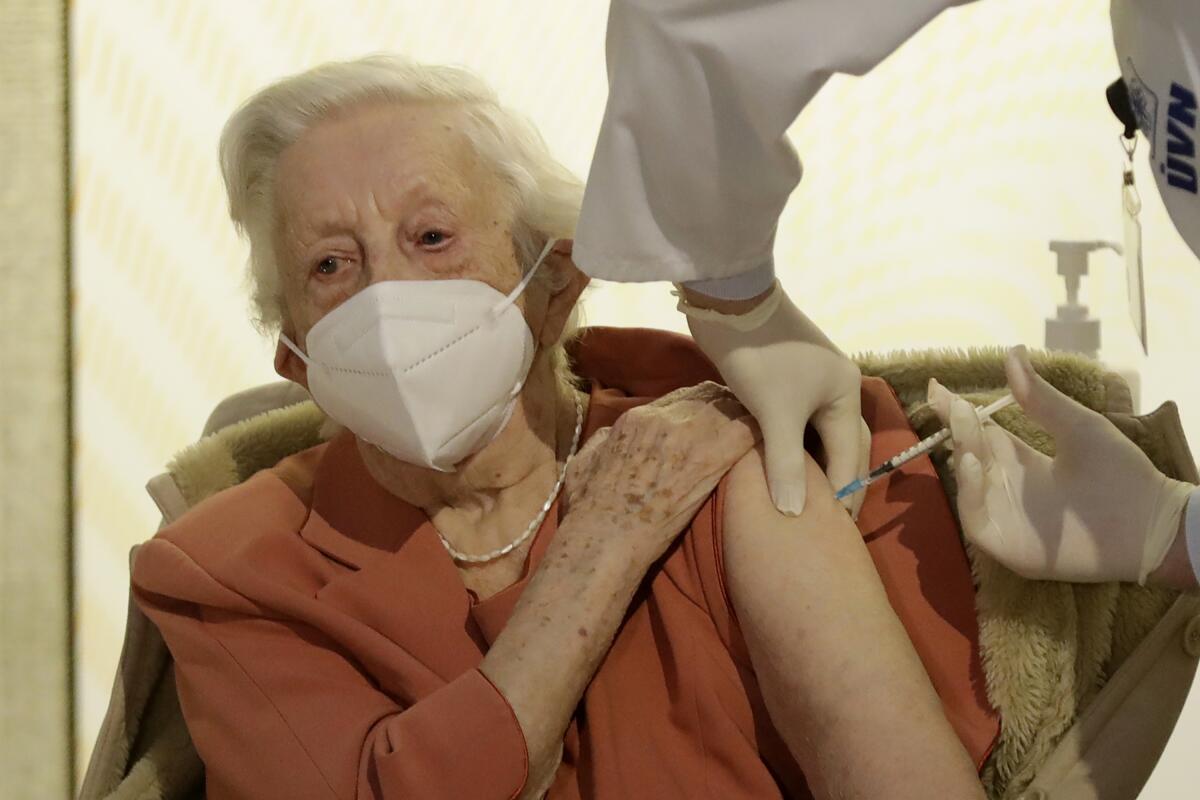
- Share via
WARSAW — European Union nations officially kicked off a coordinated effort Sunday to give COVID-19 vaccinations to some of the most vulnerable among their nearly 450 million people, marking a moment of hope in the continent’s battle against the worst public health crisis in a century.
Even though a few countries started giving doses a day early, the coordinated rollout for a bloc of 27 nations and nearly 450 million people aimed at projecting a unified message that the vaccine was safe and was Europe’s best chance to emerge from the pandemic and the economic devastation caused by months of lockdown.
For healthcare workers who have been battling the virus with only masks and shields to protect them, the vaccines represented an emotional relief as well as a very public chance to urge people to protect themselves and others.
“Today I’m here as a citizen, but most of all as a nurse, to represent my category and all the health workers who choose to believe in science,” said Claudia Alivernini, a 29-year-old nurse who was the first of five doctors and nurses at the Spallanzani infectious disease hospital in Rome to receive the vaccine.
Italian virus czar Domenico Arcuri said it was significant that Italy’s first vaccine doses were administered at Spallanzani, where a Chinese couple visiting from Wuhan tested positive in January and became Italy’s first confirmed cases.
Within weeks, northern Lombardy would become the epicenter of the outbreak in Europe and a cautionary tale of what happens when even wealthy countries find themselves unprepared for a pandemic.
Lombardy still accounts for around a third of the dead in Italy, which has the continent’s worst confirmed virus toll at nearly 72,000 dead.
Tough new coronavirus restrictions have begun in the United Kingdom, with Scotland and Northern Ireland under tighter measures
“Today is a beautiful, symbolic day: All the citizens of Europe together are starting to get their vaccinations, the first ray of light after a long night,” Arcuri told reporters outside the hospital.
But he cautioned: “We all have to continue to be prudent, cautious and responsible. We still have a long road ahead, but finally we see a bit of light.”
The vaccines, developed by Germany’s BioNTech and American drugmaker Pfizer, started arriving in super-cold containers at EU hospitals Friday from a factory in Belgium. The EU has seen some of the world’s earliest and hardest-hit virus hot spots, including Italy and Spain.
In the Los Olmos nursing home in the Spanish city of Guadalajara, northeast of Madrid, a 96-year-old resident and a caregiver were the first Spaniards to receive the vaccine.
“Let’s see if we can all behave and make this virus go away,” said Araceli Hidalgo, the resident, after receiving her injection.
The Los Olmos home had two confirmed COVID-19 deaths and 11 more deaths among residents with symptoms who were never tested during the chaotic initial months.
“What we want is for as many people as possible to get vaccinated,” said Mónica Tapias, the 48-year-old worker at the home. “We have lost some residents here to COVID, and that has been very sad. Let’s see if this can finally finish with this.”
The Czech Republic was spared the worst early on only to see their healthcare systems nearly collapse in the fall. In Prague, Czech Prime Minister Andrej Babis received his shot at dawn Sunday and said, “There’s nothing to worry about.” Sitting next to him in a wheelchair was World War II veteran Emilie Repikova, who also received the shot.
South Korea had seemed to be winning the fight against the coronavirus, but a deadly resurgence has reached new heights during Christmas week.
Altogether, the EU’s 27 nations have recorded at least 16 million coronavirus infections and more than 336,000 deaths — huge numbers that experts still agree understate the true toll of the pandemic due to missed cases and limited testing.
European Commission President Ursula von der Leyen released a video Saturday celebrating the vaccine rollout, calling it “a touching moment of unity.”
The campaign should ease frustrations that were building up, especially in Germany, as Britain, Canada and the United States kicked off their inoculation programs with the same vaccine weeks earlier.
As it turned out, some EU immunizations began a day early in Germany, Hungary and Slovakia. The operator of a German nursing home where dozens of people were vaccinated Saturday, including a 101-year-old woman, said “every day that we wait is one day too many.”
Each country is deciding on its own who will get the first shots. Spain, France and Germany, among others, are vowing to put older people and residents in nursing homes first.
Poland is also prioritizing doctors, nurses and others on the frontlines of fighting the virus. The Central European nation was largely spared the surge that hit Western Europe in the spring, but has seen high daily infections and deaths this fall.
EU leaders are counting on the vaccine rollout to help the bloc project a sense of unity in a complex lifesaving mission after it faced a year of difficulties in negotiating a post-Brexit trade deal with Britain.
South Africa says a new variant of the coronavirus, different from one in Britain, is driving a resurgence of infections, hospitalizations and deaths.
Austrian Chancellor Sebastian Kurz called the vaccines — which were developed in record time — a “game-changer.”
“We know that today is not the end of the pandemic, but it is the beginning of the victory,” he said.
Among the politicians who got shots Sunday to promote a wider acceptance of vaccinations was Bulgarian Health Minister Kostadin Angelov.
“I can’t wait to see my 70-year-old father without fear that I could infect him,” Angelov said.
Meanwhile, the first cases of a new virus variant that has been spreading rapidly around London and southern England have now been detected in France and Spain. The new variant, which British authorities said is much more easily transmitted, has caused European countries, the United States and China to put new restrictions on travel for people from Britain.
The German pharmaceutical company BioNTech is confident that its coronavirus vaccine works against the new U.K. variant, but said further studies are needed to be completely certain.
The European Medicines Agency on Jan. 6 will be considering approving a second coronavirus vaccine, this one by Moderna, which has already been approved for use in the United States.
Andreas Raouna, 84, said he was honored to be among the first to get the shot in Cyprus and criticized vaccine skeptics of being “in league with a murderer.”
While there may be some side effects, he said, “if the coronavirus hits you, it’ll be the end of you.”
More to Read
Sign up for Essential California
The most important California stories and recommendations in your inbox every morning.
You may occasionally receive promotional content from the Los Angeles Times.
